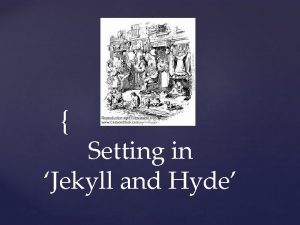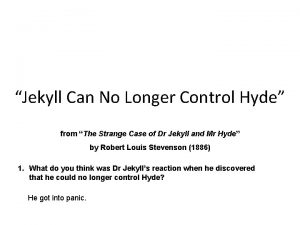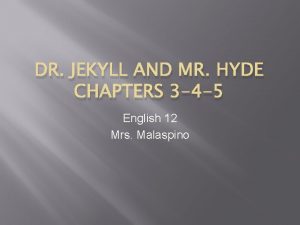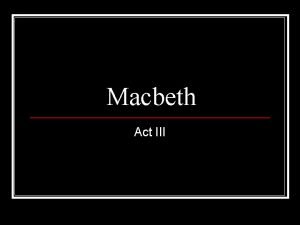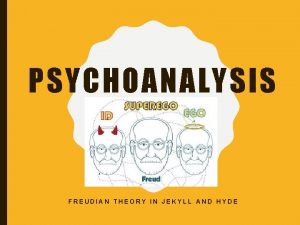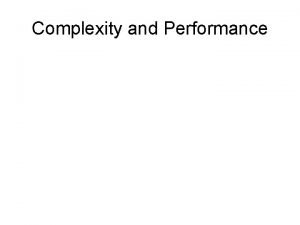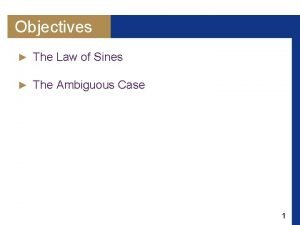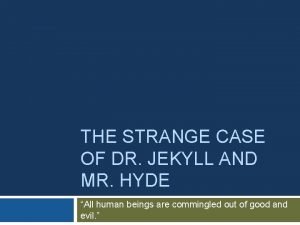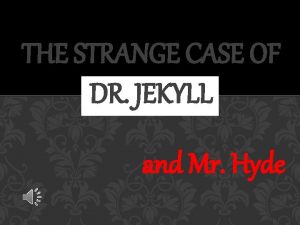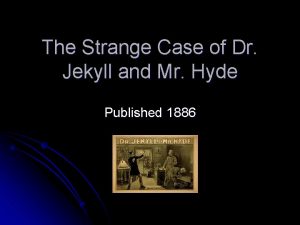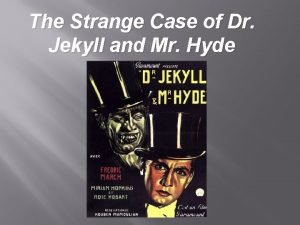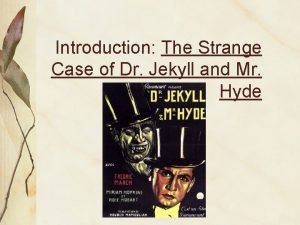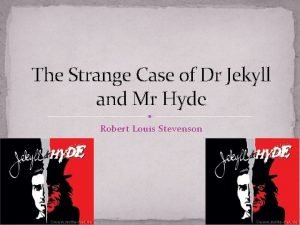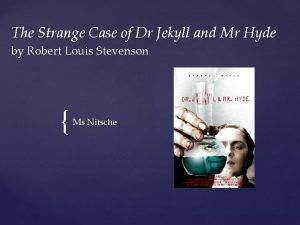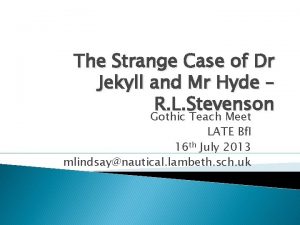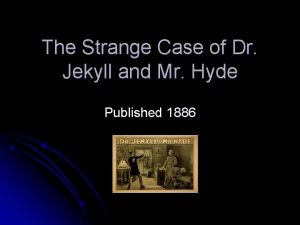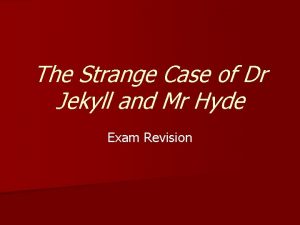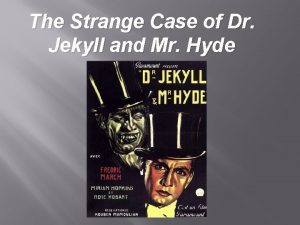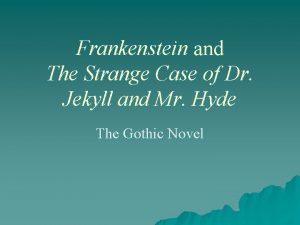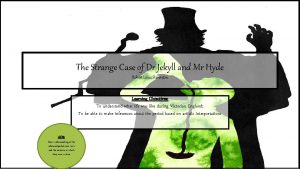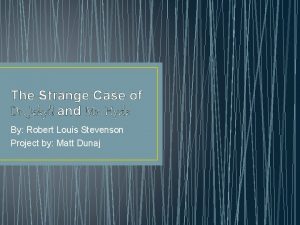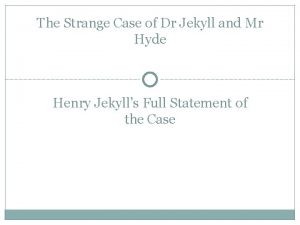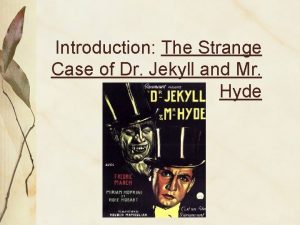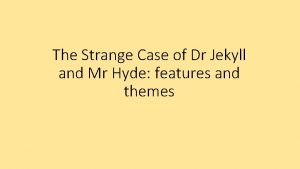The Strange Case of Dr Jekyll and Mr



















- Slides: 19

‘The Strange Case of Dr Jekyll and Mr Hyde’ { Addiction

Used to describe pursuit of a habit Morphine, cocaine, alcohol Seen as hereditary physical diseases Later seen as a disease of the will – psychological Late 19 th century – dependence or addiction to substances really recognised. The 19 th Century

Samuel Taylor Coleridge Thomas De Quincey Robert Burns R L Stevenson An exploration of a second self to heighten creativity. Or so they thought! Experiences, pleasures, and perceptions not really their own – Jekyll? Literature

Often seen as a metaphor for addiction Two-sided personality – alcohol dependency Drugs and sex Jekyll also addicted to Hyde – a psychological addiction to a darker personality. The novel

Psychological Jekyll is mentally dependent on his creation ‘I felt younger, lighter, happier in body; within I was conscious of a heady recklessness, a current of disordered sensual images running a millrace in my fancy, a solution of the bonds of obligation, an unknown but not an innocent freedom of the soul. I knew myself, at the first breath of the new life, to be more wicked, tenfold more wicked, sold a slave to my original evil; and the thought, in that moment, braced and delighted me like wine. ' – Full statement… Here, J takes a delight in his addiction. Syndetic list suggests excitement and a thrill in his behaviour Imagery – ‘current’ suggests a spark or awakening of the senses. Use of ‘slave’ suggests lack of control/ addiction.

His habit affects him physically Hyde Change in appearance as Jekyll – looks unwell Utterson suggests Jekyll has a malady ‘that both torture and deform the sufferer’ – syphilis Clearly causes pain Dependent on it and craved greater strength – ‘For God’s sake… find me some of the old. ’ Physiological

J is addicted to a duplicity of life that society would never let him explore. He discovers perverse pleasures through Hyde and he cannot let this go. Tries to avoid admission of this – tries to convince others that they are separate entities. Dual Nature of Man

They are the same person. Jekyll takes pleasure in Hyde’s depravity. Easy for Hyde to take control without the drug. However…

Stevenson explores addiction to comment on the two-sided nature of society. Jekyll’s secret addiction arguably mirrors the darker side of society and an unwillingness to confront its problems. So, addiction is greatly linked with the major themes of the novel – duality of man, the beast within us all, secrecy. So what…

• • • Hyde being secretive – doesn’t want others to know; enters the back door of laboratory. Jekyll’s change in appearance at the window. Jekyll’s language – thinks he can give it up (Hyde) whenever he wants. Jekyll’s removal from society. Jekyll’s account in ‘The Full Statement…’ Find and copy quotations and note down page numbers Where to find quotations about Addiction

Stevenson’s Jekyll and Hyde is a novella mostly concerned with addiction. How is addiction explored in the text and to what extent do you agree with the previous statement? Question

Evaluation (Analysis) This is the chance for you to explain how the quotation backs up the point you are making You need to make sure that you fully explain the quotation or shot/scene/technique. You then need to evaluate it - give your opinion on how successful it is. Your opinion should be implicit - do not write “I think”.

1. Break the sentence down – look at the meaning and connotations of individual words, techniques and phrases, as well as the whole sentence e. g. “Mr Hyde shrank back with a hissing intake of breath. ” “shrank back” – suggests that Hyde fears discovery, has connotations of secrecy and hiding. “hissing” – use of onomatopoaeia, which suggests that he is hissing in pain – as though the thought of discovery is physically painful for him. 3 Steps for Analysing Quotations

2. Think about what the whole sentence suggests “Mr Hyde shrank back with a hissing intake of breath. ” e. g. This quote shows that Hyde does not want to be discovered, especially by Utterson. 3 Steps for Analysing Quotations

3. Comment on the context of the quotation e. g. “Mr Hyde shrank back with a hissing intake of breath. ” This first meeting with Hyde effectively emphasises themes of secrecy and discovery that run throughout the novel, as well as heavily implies classic behaviours of addiction in Hyde’s need to remain hidden. The painful reaction he has to discovery highlights the mysterious nature of his character, and cleverly foreshadows the pain and destruction that is still to come. 3 Steps for Analysing Quotations

P - In our first meeting with Mr Hyde, Stevenson immediately explores theme of addiction through his portrayal of Hyde’s desperate need for isolation. E - “Mr Hyde shrank back with a hissing intake of breath. ” E- - “shrank back” – suggests that Hyde fears discovery, has connotations of secrecy and hiding. - “hissing” – onomatopoaeia, hissing in pain –thought of discovery is physically painful for him. - does not want to be discovered. - emphasises themes of secrecy and discovery - classic behaviour of addiction - painful reaction – mysterious - foreshadows pain still to come Example Paragraph Plan

Point (topic sentence): In our first meeting with Mr Hyde, Stevenson immediately explores theme of addiction through his portrayal of Hyde’s desperate need for isolation. Evidence (quotation): At Mr Utterson’s first encounter with Hyde, it is clear he is anxious to remain in solitude. “Mr Hyde shrank back with a hissing intake of breath. ” Evaluation (analysis): Stevenson’s description of Hyde and how he “shrank back” suggests that Hyde fears discovery, through its connotations of secrecy and hiding. His use of onomatopoeia in “hissing” explores this further, inferring that he is hissing in pain – as though the thought of discovery is physically painful for him. It is apparent that Hyde does not want to be discovered, especially by Utterson. This first meeting with Hyde effectively emphasises themes of secrecy and discovery that run throughout the novel, as well as heavily implies classic behaviours of addiction in Hyde’s need to remain hidden. The painful reaction he has to discovery highlights the mysterious nature of his character, and cleverly foreshadows the pain and destruction that this addiction will soon bring about. Example Paragraph

An effective conclusion should: Refer back to the questions. Summarise your main points. Comment on how effective the writer/director has been in their use of techniques. How do we write a conclusion?

Stevenson’s ‘The Strange Case of Dr Jekyll and Mr Hyde’ is a fascinating study of the deterioration of physical and mental capacities brought on by addiction. Through his use of word choice and contrast, Stevenson effectively shows the extent to which cravings and dependence take hold of Dr Jekyll, exploring classic signs of this affliction, such as Hyde’s secrecy and Jekyll’s self-imposed isolation. Ultimately, the novella acts as an extended metaphor for the cruel and powerful qualities of addiction, successfully highlighting how - in carelessly indulging in his obsession with the darker side of his nature - Jekyll ultimately loses both his sense of self and, tragically, his life. Example Conclusion
 Setting of jekyll and hyde
Setting of jekyll and hyde Jekyll can no longer control hyde
Jekyll can no longer control hyde Based on chapters 3 and 4 of the strange case
Based on chapters 3 and 4 of the strange case The strange case of beriberi worksheet answers
The strange case of beriberi worksheet answers Best worst and average case
Best worst and average case My strange and self abuse is the initiate fear
My strange and self abuse is the initiate fear Limitations of the strange situation
Limitations of the strange situation But tis strange and oftentimes to win us to our harm
But tis strange and oftentimes to win us to our harm Jekyll and hyde psychoanalysis
Jekyll and hyde psychoanalysis Dr jekyll key quotes
Dr jekyll key quotes Short case vs long case
Short case vs long case Average case complexity of binary search
Average case complexity of binary search Bubble sort best case and worst case
Bubble sort best case and worst case Bubble sort best case and worst case
Bubble sort best case and worst case Bubble sort best case and worst case
Bubble sort best case and worst case Law of sines two solutions
Law of sines two solutions Hình ảnh bộ gõ cơ thể búng tay
Hình ảnh bộ gõ cơ thể búng tay Lp html
Lp html Bổ thể
Bổ thể Tỉ lệ cơ thể trẻ em
Tỉ lệ cơ thể trẻ em
